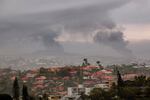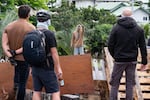
A view of New Caledonia's capital Nouméa on Wednesday amid protests over a proposed change to France's Constitution that would give voting rights to an increasing number of non-Indigenous residents of the French territory in the Pacific.
Delphine Mayeur / AFP via Getty Images
Deadly violence continued for a third night in the French Pacific territory of New Caledonia over a proposed change to France’s Constitution that would give voting rights to an increasing number of non-Indigenous residents of the archipelago.
French TV reports showed stores and cars in New Caledonia that were looted and burned, and citizens, some of them armed with rifles and machetes, clashing with riot police. Plumes of smoke from numerous fires rose over New Caledonia's capital of Nouméa.
At least four people have been killed in the violence, including a police officer who was shot in the forehead at point blank range, according to French Interior Minister Gérald Darmanin. Citizens have set up road blocks and formed militias to try to protect their neighborhoods. Many residents of Nouméa have barricaded themselves behind closed doors and cower at home.

Masked residents watch an activist in Nouméa on Wednesday.
Delphine Mayeur / AFP via Getty Images
France declared a state of emergency on Wednesday for at least 12 days and dispatched hundreds of riot police to the archipelago, as French President Emmanuel Macron called for calm.
Macron urged New Caledonian political leaders to "unambiguously condemn all this violence" and invited both pro- and anti-independence leaders to meet him "face to face" in Paris.
Louis Le Franc, the high commissioner for New Caledonia, called on both loyalist and pro-independence citizens to heed the call for calm. "We've entered into a dangerous, deadly spiral now," he told French television. "If the violence does not stop, there will be many more dead."
The semiautonomous territory is important for France as the European country cements its place as a strategic power player in the Indo-Pacific region.
Political tensions have simmered for years in the archipelago — pitting the island's largely pro-independence Indigenous Kanak communities against the mostly French inhabitants opposed to breaking away from France.
France annexed the islands in 1853. White settlement and the repression of the Indigenous population followed. In the 1980s, violence exploded across New Caledonia, with 19 pro-independence activists and two gendarmes killed. That eventually paved the way for the Nouméa Accord in 1998, a promise by France to give greater political autonomy to the Kanak community.
There have been three referendums for independence since 2018. All have failed. But the vote in favor has grown — to as high as 47% in 2020. Kanak voters boycotted the 2021 referendum.
The move by the French Parliament to unfreeze voting lists and open them up to residents who have lived in New Caledonia for at least 10 years is seen by Kanaks as diluting the Indigenous vote and changing the rules in the middle of the game, say analysts.
Still, longtime members of the independence movement called for calm.
"I'm calling on parents to talk to their kids," Kanak pro-independence resident Jean Kays told French television. "And I'm saying to young people, this is not the struggle for independence."
Copyright 2024 NPR. To see more, visit https://www.npr.org.